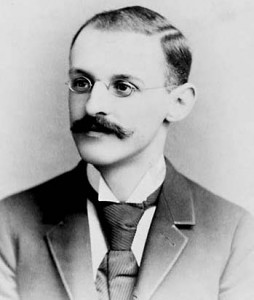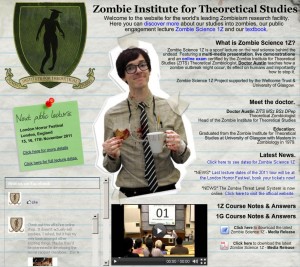Last week the Guardian wrote a story about the role of universities in the 21st century and how the coalition government’s higher education reform is raising questions about the purpose of universities (‘What are universities for?‘, 10 October 2011). And this got me thinking about why we’re all here, what the role of a university such as BU should be, and where does research fit into all of this…?
 The role of a university has been debated since the nineteenth century. In 1852 Cardinal Newman wrote that the sole function of a university was to teach universal knowledge, embodying the idea of ‘the learning university’. Newman believed that knowledge is valuable and important for its own sake and not just for its perceived use to society (this is very different from the current thinking on the importance of research impact, public accountability and the value of research findings to society at large, issues which I imagine Newman would have thought of as irrelevant!). There was not a great deal in Newman’s work about the importance of research in a university, but research was beginning to play the starring role in mainland Europe where Prussian education minister Wilhelm von Humboldt wrote of the concept of ‘the research university’ and eventually set up the Humboldt University of Berlin. After the Napoleonic Wars, von Humboldt’s view was that the research university was a tool for national rebuilding through the prioritisation of graduate research over undergraduate teaching. This model soon became the blueprint for the rest of Europe, the United States and Japan. Arguably the Russell Group universities are today still structured in a similar way to that envisaged by von Humboldt two hundred years ago.
The role of a university has been debated since the nineteenth century. In 1852 Cardinal Newman wrote that the sole function of a university was to teach universal knowledge, embodying the idea of ‘the learning university’. Newman believed that knowledge is valuable and important for its own sake and not just for its perceived use to society (this is very different from the current thinking on the importance of research impact, public accountability and the value of research findings to society at large, issues which I imagine Newman would have thought of as irrelevant!). There was not a great deal in Newman’s work about the importance of research in a university, but research was beginning to play the starring role in mainland Europe where Prussian education minister Wilhelm von Humboldt wrote of the concept of ‘the research university’ and eventually set up the Humboldt University of Berlin. After the Napoleonic Wars, von Humboldt’s view was that the research university was a tool for national rebuilding through the prioritisation of graduate research over undergraduate teaching. This model soon became the blueprint for the rest of Europe, the United States and Japan. Arguably the Russell Group universities are today still structured in a similar way to that envisaged by von Humboldt two hundred years ago.
 Moving into the twentieth century and we come across American educationalist Abraham Flexner who wrote of ‘the modern university’. In Flexner’s view universities had a responsibility to pursue excellence, with academic staff being able to seamlessly move from the research lab to the classroom and back again. The pursuit of excellence features in many universities strategies, and sounds very similar to the message conveyed by the REF team as part of the REF2014 guidance. The union of research and education also sounds similar to the current structure of many UK universities.
Moving into the twentieth century and we come across American educationalist Abraham Flexner who wrote of ‘the modern university’. In Flexner’s view universities had a responsibility to pursue excellence, with academic staff being able to seamlessly move from the research lab to the classroom and back again. The pursuit of excellence features in many universities strategies, and sounds very similar to the message conveyed by the REF team as part of the REF2014 guidance. The union of research and education also sounds similar to the current structure of many UK universities.
Taking into account the complexity of universities in the twenty first century, however, all of these views are a little too simplistic. Today’s universities have much broader remits and have to be all three ideas of a university – learning, research and modern. The universities minister David Willetts describes universities as institutions that “push forward the frontiers of knowledge” and “transform people’s lives”, significantly contributing to society and the economy. Peter McCaffery notes that universities now regularly encompass four roles:
- Finishing school (the last stage of general education)
- Professional school (the training of elite workers)
- Knowledge factory (the production of science, technology and ideology)
- Cultural institution (the expression of our individual and collective sense of being)
This is a huge remit for universities to take on, but makes them exciting places to work!
A quick look at the mission statements of a handful of UK universities indicates a common purpose based on the views of all of the aforementioned scholars:
- “…to contribute to society through the pursuit of education, learning, and research at the highest international levels of excellence” (Cambridge)
- “…to pursue and share knowledge and understanding, both for their own sake and to help individuals and society fulfil their potential” (Bristol)
- “…to pursue research, learning and teaching of international distinction and impact” (Cardiff)
 The creation and sharing of new knowledge and new ideas has become the principal purpose of many modern universities. In Northern and Western Europe and North America the university has become the key producer of knowledge (through research) and the key sharer of knowledge (through teaching). The University of Bristol’s Vice-Chancellor Professor Eric Thomas claims that universities are the knowledge engines of our society having produced the vast majority of society’s breakthroughs and innovations, such as: the computer, the web, the structure of DNA, Dolly the Sheep, and the fibre optic cable. Where would we be without these breakthroughs, and would they have come about so quickly without university research?
The creation and sharing of new knowledge and new ideas has become the principal purpose of many modern universities. In Northern and Western Europe and North America the university has become the key producer of knowledge (through research) and the key sharer of knowledge (through teaching). The University of Bristol’s Vice-Chancellor Professor Eric Thomas claims that universities are the knowledge engines of our society having produced the vast majority of society’s breakthroughs and innovations, such as: the computer, the web, the structure of DNA, Dolly the Sheep, and the fibre optic cable. Where would we be without these breakthroughs, and would they have come about so quickly without university research?
 Being part of an environment in which knowledge creation thrives creates a unique and amazing learning experience for students, both at undergraduate and postgraduate levels. BU’s focus on the fusion of research, education and professional practice enables the creation of this type of environment through the continuous and valuable exchange of knowledge (BU2018).
Being part of an environment in which knowledge creation thrives creates a unique and amazing learning experience for students, both at undergraduate and postgraduate levels. BU’s focus on the fusion of research, education and professional practice enables the creation of this type of environment through the continuous and valuable exchange of knowledge (BU2018).
By engaging with research, academics can ensure their knowledge is cutting edge and relevant, ensure students receive a quality learning experience, and deliver high quality professional practice. If you’re interested in getting more involved with research, talk to the Research Development Unit and we’ll get you started!
Finally… What do you think the role of the twenty first century university is??
 The Wellcome Trust have recently published details of public engagement events due to be held in November that will be funded via their Public Engagement Awards. We’ve summarised a few below:
The Wellcome Trust have recently published details of public engagement events due to be held in November that will be funded via their Public Engagement Awards. We’ve summarised a few below: Zombie Science Z1, a live comedy show exploring the science of the undead, is running at 7:30 pm on 15, 16 and 17 November as part of the London Horror Festival. It discusses how a zombie outbreak might occur, what zombies would be like and how to stop them, by examining a variety of biomedical topics such as infectious diseases, virology and genetic modification.
Zombie Science Z1, a live comedy show exploring the science of the undead, is running at 7:30 pm on 15, 16 and 17 November as part of the London Horror Festival. It discusses how a zombie outbreak might occur, what zombies would be like and how to stop them, by examining a variety of biomedical topics such as infectious diseases, virology and genetic modification.



 The event opened with a fantastic presentation by
The event opened with a fantastic presentation by  The second speaker was
The second speaker was  The event then focused on BU’s experience of open access publishing with presentations from
The event then focused on BU’s experience of open access publishing with presentations from  Then come to our free Open Access event this Wednesday in the EBC!
Then come to our free Open Access event this Wednesday in the EBC!

 Following the announcement by the Vice Chancellor in August 2011 that CRE would move from Finance & Commercial Services I am delighted today to formally launch the Research & Knowledge Exchange Office (R&KEO) with the remit of supporting all research and knowledge exchange (formally enterprise) activity at BU.
Following the announcement by the Vice Chancellor in August 2011 that CRE would move from Finance & Commercial Services I am delighted today to formally launch the Research & Knowledge Exchange Office (R&KEO) with the remit of supporting all research and knowledge exchange (formally enterprise) activity at BU. The role of a university has been debated since the nineteenth century. In 1852 Cardinal Newman wrote that the sole function of a university was to teach universal knowledge, embodying the idea of ‘the learning university’. Newman believed that knowledge is valuable and important for its own sake and not just for its perceived use to society (this is very different from the current thinking on the importance of research impact, public accountability and the value of research findings to society at large, issues which I imagine Newman would have thought of as irrelevant!). There was not a great deal in Newman’s work about the importance of research in a university, but research was beginning to play the starring role in mainland Europe where Prussian education minister Wilhelm von Humboldt wrote of the concept of ‘the research university’ and eventually set up the Humboldt University of Berlin. After the Napoleonic Wars, von Humboldt’s view was that the research university was a tool for national rebuilding through the prioritisation of graduate research over undergraduate teaching. This model soon became the blueprint for the rest of Europe, the United States and Japan. Arguably the Russell Group universities are today still structured in a similar way to that envisaged by von Humboldt two hundred years ago.
The role of a university has been debated since the nineteenth century. In 1852 Cardinal Newman wrote that the sole function of a university was to teach universal knowledge, embodying the idea of ‘the learning university’. Newman believed that knowledge is valuable and important for its own sake and not just for its perceived use to society (this is very different from the current thinking on the importance of research impact, public accountability and the value of research findings to society at large, issues which I imagine Newman would have thought of as irrelevant!). There was not a great deal in Newman’s work about the importance of research in a university, but research was beginning to play the starring role in mainland Europe where Prussian education minister Wilhelm von Humboldt wrote of the concept of ‘the research university’ and eventually set up the Humboldt University of Berlin. After the Napoleonic Wars, von Humboldt’s view was that the research university was a tool for national rebuilding through the prioritisation of graduate research over undergraduate teaching. This model soon became the blueprint for the rest of Europe, the United States and Japan. Arguably the Russell Group universities are today still structured in a similar way to that envisaged by von Humboldt two hundred years ago. Moving into the twentieth century and we come across American educationalist Abraham Flexner who wrote of ‘the modern university’. In Flexner’s view universities had a responsibility to pursue excellence, with academic staff being able to seamlessly move from the research lab to the classroom and back again. The pursuit of excellence features in many universities strategies, and sounds very similar to the message conveyed by the REF team as part of the REF2014 guidance. The union of research and education also sounds similar to the current structure of many UK universities.
Moving into the twentieth century and we come across American educationalist Abraham Flexner who wrote of ‘the modern university’. In Flexner’s view universities had a responsibility to pursue excellence, with academic staff being able to seamlessly move from the research lab to the classroom and back again. The pursuit of excellence features in many universities strategies, and sounds very similar to the message conveyed by the REF team as part of the REF2014 guidance. The union of research and education also sounds similar to the current structure of many UK universities. The creation and sharing of new knowledge and new ideas has become the principal purpose of many modern universities. In Northern and Western Europe and North America the university has become the key producer of knowledge (through research) and the key sharer of knowledge (through teaching). The University of Bristol’s Vice-Chancellor Professor Eric Thomas claims that universities are the knowledge engines of our society having produced the vast majority of society’s breakthroughs and innovations, such as: the computer, the web, the structure of DNA, Dolly the Sheep, and the fibre optic cable. Where would we be without these breakthroughs, and would they have come about so quickly without university research?
The creation and sharing of new knowledge and new ideas has become the principal purpose of many modern universities. In Northern and Western Europe and North America the university has become the key producer of knowledge (through research) and the key sharer of knowledge (through teaching). The University of Bristol’s Vice-Chancellor Professor Eric Thomas claims that universities are the knowledge engines of our society having produced the vast majority of society’s breakthroughs and innovations, such as: the computer, the web, the structure of DNA, Dolly the Sheep, and the fibre optic cable. Where would we be without these breakthroughs, and would they have come about so quickly without university research?


 The
The  The first closing date for the BU Research Development Fund – Small Grants Scheme (RDF-SGS) is 31 October 2011.
The first closing date for the BU Research Development Fund – Small Grants Scheme (RDF-SGS) is 31 October 2011. October 10th is World Mental Health Day and to support it BU is holding a week of activities around the topic of mental health. The events are being organised in partnership with Dorset HealthCare University NHS Foundation Trust. The week will provide an opportunity for staff to build and develop links with organisations in the area of mental health.
October 10th is World Mental Health Day and to support it BU is holding a week of activities around the topic of mental health. The events are being organised in partnership with Dorset HealthCare University NHS Foundation Trust. The week will provide an opportunity for staff to build and develop links with organisations in the area of mental health. The Do’s of writing a good research bid:
The Do’s of writing a good research bid: 










 New weight change BU paper
New weight change BU paper One week to go! | The 16th Annual Postgraduate Research Conference
One week to go! | The 16th Annual Postgraduate Research Conference Geography and Environmental Studies academics – would you like to get more involved in preparing our next REF submission?
Geography and Environmental Studies academics – would you like to get more involved in preparing our next REF submission? Congratulations to three former BU staff
Congratulations to three former BU staff MSCA Staff Exchanges 2024 Call – internal deadline
MSCA Staff Exchanges 2024 Call – internal deadline Applications are now open for 2025 ESRC Postdoctoral Fellowships!
Applications are now open for 2025 ESRC Postdoctoral Fellowships! Horizon Europe – ERC CoG and MSCA SE webinars
Horizon Europe – ERC CoG and MSCA SE webinars MaGMap: Mass Grave Mapping
MaGMap: Mass Grave Mapping ERC grants – series of webinars
ERC grants – series of webinars